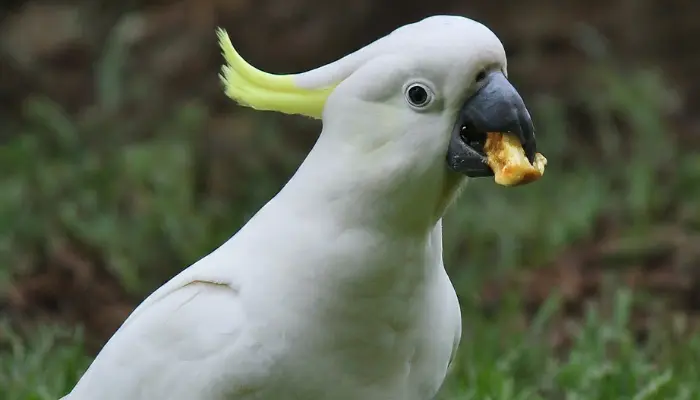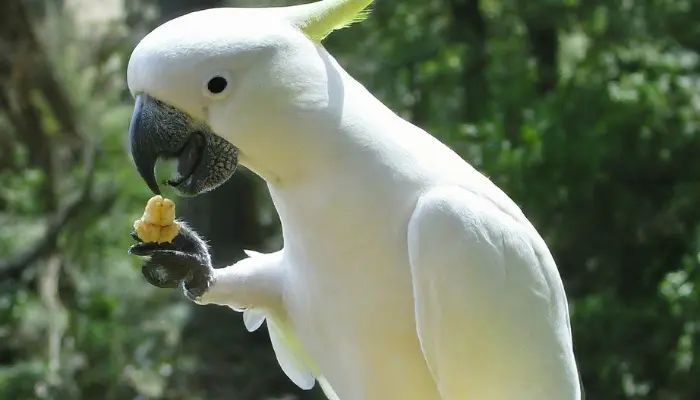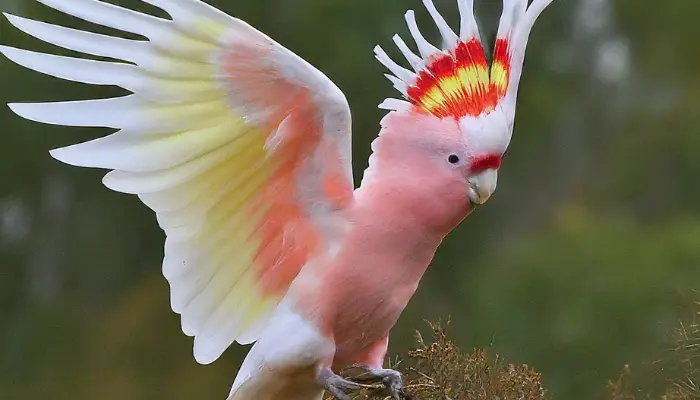Cockatoos are among the most charming and intelligent of avian companions captivating bird enthusiasts with their vibrant personalities and striking plumage. It demands commitment, patience, and a deep understanding of their complex needs. From providing proper nutrition to fostering mental stimulation. The care of a cockatoo encompasses various aspects crucial for their well-being.
In this article, we will discuss how to take care of a cockatoo and essential guidelines and tips to ensure a fulfilling and enriching life for your feathered friend. Whether you are a novice enthusiast or a seasoned avian aficionado, mastering the art of cockatoo care is essential for nurturing a harmonious bond with these delightful creatures.
Understanding Cockatoo Species
Cockatoos with their vibrant plumage and charming personalities encompass a diverse array of species, each with its own distinct characteristics and traits. From the iconic Sulphur-crested to the majestic Umbrella and the affectionate Moluccan, understanding the nuances of these species is essential for aspiring avian enthusiasts. In this comprehensive guide, we embark on a journey through the fascinating world of cockatoos, exploring their unique attributes, behaviors, and care requirements.
Whether you are drawn to the playful antics of the Lesser Sulfur-crested or the gentle demeanor of the Goffin’s, selecting the right cockatoo species as a pet entails careful consideration of factors such as size, temperament, and level of interaction. Join us as we unravel the secrets of these captivating birds and discover the perfect feathered companion to enrich your life.

Creating a Suitable Environment for Cockatoos
Creating a suitable environment for cockatoos involves a combination of space, enrichment, diet, and social interaction. Cockatoos are highly intelligent and social birds that require mental and physical stimulation to thrive. Here are some key elements to consider.
- Cage or Aviary Size: Cockatoos need ample space to move around, stretch their wings, and exercise. For a single bird, the minimum cage size should be at least 3 feet by 3 feet by 4 feet. For pairs or groups, larger aviaries are preferable.
- Enrichment: Cockatoos are curious and playful birds, so providing them with a variety of toys, puzzles, perches, and foraging opportunities is essential. Rotate toys regularly to keep them engaged and prevent boredom.
- Perches: Natural wood perches of varying diameters help exercise their feet and prevent foot problems. Place perches at different heights to encourage climbing and provide a variety of textures.
- Nutrition: A balanced diet is crucial for the health of cockatoos. Offer a variety of fresh fruits, vegetables, leafy greens, pellets, and occasional nuts or seeds. Avoid foods that are high in salt, sugar, or fat.
- Social Interaction: Cockatoos are highly social birds that require daily interaction with their human caregivers. Spend time talking, playing, and bonding with your cockatoo to prevent loneliness and behavioral issues.
- Quiet Retreat: Cockatoos need a quiet retreat within their cage or aviary where they can rest undisturbed. Provide a cozy nest box or enclosed area where they can retreat when they feel stressed or tired.
- Temperature and Lighting: Cockatoos are sensitive to temperature extremes. Keep their environment within a comfortable temperature range (typically 65-80°F or 18-27°C) and provide access to natural sunlight or full-spectrum lighting for at least 10-12 hours a day.
- Safety: Remove any toxic plants, chemicals, or objects that could harm your cockatoo. Ensure that windows and doors are securely closed when your bird is out of its cage to prevent accidents or escapes.
- Regular Veterinary Check-ups: Schedule regular check-ups with an avian veterinarian to monitor your cockatoo’s health and catch any potential issues early.
By providing a stimulating, safe, and nurturing environment, you can ensure that your cockatoo lives a happy and healthy life. Remember that each bird is unique, so observe your cockatoo’s behavior and preferences to tailor their environment accordingly.
Importance of a Balanced Diet for Cockatoos
A balanced diet is crucial for the health and well-being of cockatoos and other living creature. Cockatoos require a diverse array of nutrients to thrive, including vitamins, minerals, proteins, carbohydrates, and healthy fats. Here are some reasons why a balanced diet is important for cockatoos.
- Nutritional Needs: Cockatoos have specific nutritional requirements to maintain optimal health. A balanced diet ensures they receive all the essential nutrients they need.
- Overall Health: A well-rounded diet supports the immune system, aids in proper digestion, promotes healthy skin and feathers, and contributes to overall vitality and longevity.
- Prevention of Health Issues: Providing a balanced diet can help prevent various health issues such as obesity, malnutrition, and deficiencies.
- Behavioral Benefits: Proper nutrition can positively impact a cockatoo’s behavior, reducing the likelihood of mood swings, aggression, and feather-plucking.

Recommended Foods and Treats for Cockatoos
Here is a more detailed breakdown of recommended foods and treats for cockatoos.
- Pellets: High-quality, nutritionally balanced pellets formulated specifically for cockatoos should form the foundation of their diet. Look for pellets that are fortified with essential vitamins and minerals.
- Fresh Fruits: Offer a variety of fresh fruits daily. Some favorites among cockatoos include apples, grapes, bananas, oranges, strawberries, and blueberries. These fruits provide essential vitamins, antioxidants, and hydration.
- Fresh Vegetables: Incorporate a mix of fresh vegetables into their diet. Cockatoos enjoy leafy greens like spinach, kale, and Swiss chard, as well as carrots, bell peppers, broccoli, sweet potatoes, and squash. These vegetables are rich in vitamins, minerals, and fiber.
- Whole Grains: Include cooked whole grains in their diet to provide carbohydrates, fiber, and some essential nutrients. Options include brown rice, quinoa, whole wheat pasta, and whole grain bread.
- Lean Proteins: Offer lean protein sources in moderation. Cooked chicken, turkey, and eggs are excellent options. Avoid seasoning or adding any sauces that may be harmful to birds.
- Nuts and Seeds: While high in fat, nuts and seeds can be offered as occasional treats. Cockatoos enjoy almonds, walnuts, sunflower seeds, pumpkin seeds, and pine nuts. These treats should be given sparingly due to their high fat content.
- Calcium Sources: Ensure your cockatoo receives enough calcium for strong bones and beak health. Provide cuttlebone, mineral blocks, or calcium-fortified foods as supplements.
- Healthy Treats: In addition to nuts and seeds, offer healthy treats such as dried fruits (unsweetened and unsulfured), whole grain crackers, or small pieces of plain popcorn as occasional rewards during training or bonding sessions.
- Water: Always provide fresh, clean water for your cockatoo to drink. Change the water daily to prevent contamination.
Remember to introduce new foods gradually and observe your cockatoo for any adverse reactions. Monitor their overall diet to ensure they are receiving a balanced nutrition, and consult with an avian veterinarian for personalized dietary recommendations.
Conclusion
Caring for a cockatoo demands dedication, patience, and a profound understanding of their needs. Selecting the right species, providing a stimulating environment, and maintaining a balanced diet are all vital for their well-being. Following the guidelines outlined in this article ensures a fulfilling life for your feathered friend. Each cockatoo is unique, so observe their preferences and behaviors closely and seek professional advice when necessary. With love and proper care, you can cultivate a harmonious bond with these delightful creatures, enriching both your lives with companionship that lasts a lifetime.
